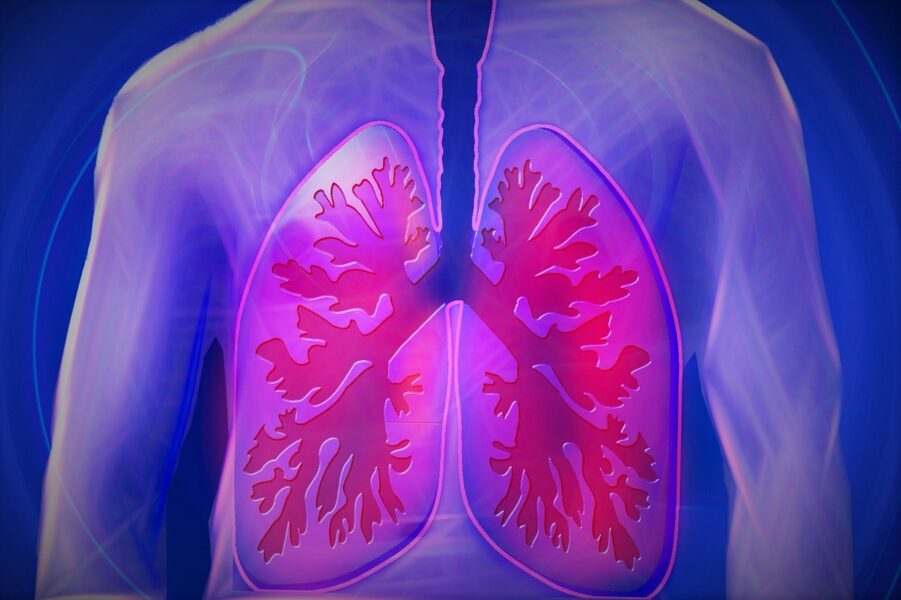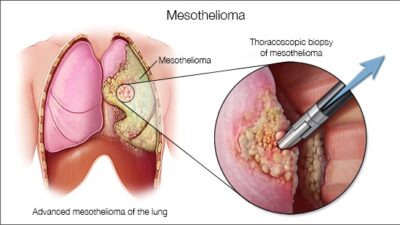Mesothelioma is a type of cancer that occurs in the thin layer of tissue that covers the majority of your internal organs (known as the mesothelium). It is most commonly caused by exposure to asbestos, a group of minerals that were once widely used in the construction and automotive industries due to their strength and heat-resistant properties.
Symptoms of mesothelioma can include shortness of breath, chest pain, and a persistent cough, although these symptoms may not appear until decades after the initial exposure to asbestos. Other potential symptoms include weight loss, fatigue, and abdominal pain or swelling.
If you have been exposed to asbestos and are experiencing symptoms, it is important to see a doctor as soon as possible. Early diagnosis and treatment can improve your chances of a positive outcome. Treatment options for mesothelioma may include surgery, chemotherapy, and radiation therapy.
It is important to note that there is no known cure for mesothelioma, and the prognosis for individuals with this cancer is generally poor. However, advances in treatment and supportive care can help improve quality of life and extend survival for some individuals with the disease.
Mesothelioma Lung Cancer
Mesothelioma is a rare and aggressive form of lung cancer that is caused by exposure to asbestos. It typically affects the lining of the lungs, but can also occur in the lining of the abdomen or heart. Symptoms of mesothelioma can include shortness of breath, chest pain, coughing, and fatigue. It is typically diagnosed through a combination of medical history, physical exam, imaging tests, and biopsy.
Treatment options may include surgery, chemotherapy, radiation therapy, and supportive care. The prognosis for mesothelioma is generally poor, with a median survival time of about 12-21 months.
Is asbestos cancer?
Yes, asbestos is a known carcinogen, and exposure to asbestos can cause cancer, specifically mesothelioma and lung cancer. It is important to take precautions when handling asbestos and to seek medical attention if you have been exposed to it.
Cancer mesothelioma symptoms
There are several common symptoms of mesothelioma, a type of cancer that affects the lining of the chest and abdomen. These symptoms may include:
- Chest pain or discomfort
- Difficulty breathing or shortness of breath
- Coughing or coughing up blood
- Swelling in the abdomen or fluid accumulation in the chest or abdomen
- Unexpected weight loss
- Fever or night sweats
- Fatigue or weakness
- Hoarseness or difficulty swallowing
It is important to note that these symptoms can also be caused by other conditions, and it is important to see a doctor for a proper diagnosis.
Mesothelioma cancer ribbon
The mesothelioma cancer ribbon is teal, which is a combination of blue and green. It represents hope, healing, and the environment. This cancer specifically affects the lining of the lungs, abdomen, and heart and is caused by exposure to asbestos. The teal ribbon serves as a symbol of awareness and support for those affected by mesothelioma.
Cancer mesothelioma survival rate
The survival rate for mesothelioma, a type of cancer that affects the lining of the lungs, heart, or abdomen, is generally poor. According to the American Cancer Society, the 5-year survival rate for mesothelioma is only around 9%. This means that only about 9% of people diagnosed with mesothelioma are still alive 5 years after their diagnosis.
However, it is important to note that survival rates vary depending on several factors, including the stage of the cancer at diagnosis, the location of the cancer, and the patient’s age and overall health. For example, people diagnosed with early-stage mesothelioma tend to have a higher survival rate than those diagnosed with advanced stages of the disease. Additionally, people who undergo surgery and other forms of treatment, such as chemotherapy and radiation, may have a better chance of survival.
It is also worth noting that mesothelioma survival rates have improved in recent years due to advances in treatment and early detection. However, it is still a very aggressive and difficult to treat cancer, and the overall survival rate remains low.
What causes mesothelioma cancer?
Mesothelioma is a rare and aggressive cancer that affects the lining of the lungs, heart, and abdomen. It is most commonly caused by exposure to asbestos, a naturally occurring mineral that was widely used in construction, shipbuilding, and other industries for its heat-resistant and insulating properties. Asbestos fibers can become airborne and inhaled, leading to the development of mesothelioma and other respiratory diseases. Other possible causes of mesothelioma include exposure to other forms of silica and radiation, as well as genetic factors.
Mesothelioma treatment guidelines
The main goal of mesothelioma treatment is to control the cancer and alleviate symptoms. Treatment options may include surgery, chemotherapy, radiation therapy, and palliative care.
- Surgery: Surgery may be used to remove as much of the cancer as possible. This may include a pleurectomy (removal of the lining of the chest), a pneumonectomy (removal of a lung), or an extrapleural pneumonectomy (removal of the lung and surrounding tissue).
- Chemotherapy: Chemotherapy uses drugs to kill cancer cells. It may be given before or after surgery, or in combination with radiation therapy.
- Radiation therapy: Radiation therapy uses high-energy beams to kill cancer cells. It may be given before or after surgery, or in combination with chemotherapy.
- Palliative care: Palliative care focuses on relieving symptoms and improving quality of life for those with advanced cancer. It may include pain management, nutrition support, and spiritual support.
It is important to discuss all treatment options with a medical team and determine the best course of action for the individual patient.
Where is mesothelioma most common in the world?
Mesothelioma is most commonly found in countries that have a history of asbestos use, such as the United States, the United Kingdom, Australia, and Canada. It is also found in other countries where asbestos was used in the past, such as Japan, Italy, and France. However, mesothelioma can occur in any country where people have been exposed to asbestos.
Mesothelioma cancer life expectancy
The life expectancy for someone with mesothelioma cancer varies depending on various factors, such as the stage of the cancer, the type of mesothelioma, and the overall health of the individual.
According to the American Cancer Society, the average life expectancy for someone with mesothelioma is around 12 to 21 months after diagnosis. However, some individuals may live longer, with a small percentage living up to 5 years or more.
Factors that may affect the life expectancy of someone with mesothelioma include:
- Stage of the cancer: Mesothelioma is usually divided into four stages (I-IV) based on how far it has spread. The earlier the cancer is caught, the better the chances of survival.
- Type of mesothelioma: There are three types of mesothelioma: pleural, peritoneal, and pericardial. Pleural mesothelioma is the most common type and tends to have a slightly better prognosis than the other two types.
- Overall health: Individuals who are in generally good health with no other underlying health conditions tend to have a better prognosis than those who have other health issues.
It is important to note that life expectancy for mesothelioma can vary greatly from person to person, and it is always best to speak with a medical professional for specific information about your individual situation.
Mesothelioma cancer stages
There are four stages of mesothelioma cancer, as determined by the extent of the cancer’s spread within the body:
- Stage 1: In this stage, the cancer is confined to the layer of cells surrounding the affected organ (the pleura or peritoneum). The cancer may have spread to nearby lymph nodes but has not reached any other organs.
- Stage 2: In this stage, the cancer has spread beyond the pleural or peritoneal lining and may have reached nearby organs or lymph nodes.
- Stage 3: In this stage, the cancer has spread to more distant organs or lymph nodes and may have caused fluid buildup in the chest or abdomen.
- Stage 4: This is the most advanced stage of mesothelioma, in which the cancer has spread to distant organs or tissues and may have caused significant swelling or fluid buildup. This stage is often associated with a poor prognosis.
Writer: Rahmat













